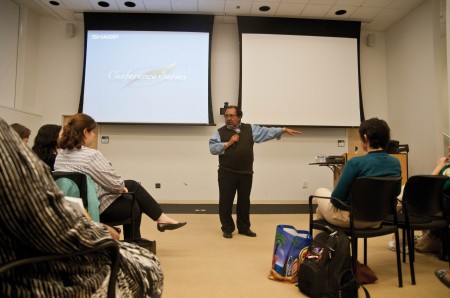“A communicable disease doesn’t understand that it needs a green card. It doesn’t understand that it should have checked with IAS before it came into the country.”
Arizona Rep. Raul Grijalva said this in an address to the George Mason University community Thursday, about the connection between health reform and immigration.
Grijalva is the co-chair of the Progressive Caucus in the House of Representatives. He has served there since 2003.
He recently caught the attention of the national media when he called on entertainers and sports teams to boycott Arizona in order to protest SB 1070, Arizona’s “papers, please” law, which will be considerd by the Supreme Court.
The speech also came on the heels of the Supreme Court proceedings regarding the Obama administration’s health reform law, dubbed “Obamacare” by opponents. Grijalva said that striking down the legislation would have the greatest impact on immigrants and people of color.
Hispanics are only 14 percent of the population in the United States, yet they make up 30 percent of the uninsured, according to the federal department of Health and Human Services.
One issue Grijalva has with health care reform is that it doesn’t allow undocumented workers to buy into the system. “But we have what we have. It’s to some extent a leap of faith,” he said.
District 7, which Grijalva represents, is the only congressional district in the nation to have a majority hispanic population. It contains 300 miles of the U.S. border with Mexico.
Native Americans, whom Grijalva describes as “the most aggrieved population in this nation,” are also a sizable demographic in his district. The health care law reauthorized Indian health care, which the federal government is required by treaty to provide.
Audrey Ferguson, a senior nursing student, asked Grijalva what he would tell people who say that they don’t want to pay for the health care of undocumented workers.
“I hate to disappoint you,” Grijalva said. “[but] you’re already paying for it.” He said that the average taxpayer picks up the tab when undocumented immigrants use the emergency room or health care systems.
Grijalva also addressed the DREAM Act, which would provide a pathway to U.S. residency for people who were brought to the United States as young children. The caveat is that they have to complete at least two years of military service or college.
“Education is the [next great] or is the civil rights issue of our generation,” he said. “My parents believed that school was the great equalizer. It doesn’t matter where you come from, [what you] look like, anything or how much money your family has.”
The DREAM Act was passed by the House in 2010 but died in the Senate. It was reintroduced recently in the House, but is stalled in committee. The Student Senate at Mason recently passed a resolution in support of the DREAM Act.
Elise Marsh, a graduate student in public health, and one of Grijalva’s constituents, said that she plans to vote for him in November. “Growing up in Tucson, I think it’s important to have a congressperson who is sensitive to the fact that immigrant populations are people, too — that they need access to health care just [like] anyone else in this country.”
“Now insurance companies aren’t allowed to kick us off our parents’ coverage until we’re 26,” said Ibrahim Kargbo, a graduate student in the public health program. “That will definitely buy us more time to find a job.” After graduation Kargbo plans to advocate for minority access to health care.
According to the Department of Health and Human Services, an additional 2.5 million young people became insured after the Affordable Care Act went was passed.
On the other hand, Democrats do not have a contingency plan if the Affordable Care Act is struck down.
“The president would have to go back and force another negotiation with Congress, which is not really in a negotiating mood,” said Kelsey Mishkin, the senior legislative assistant to Grijalva. “Of course, the coverage up to 26, that would be revisited.”







Comments